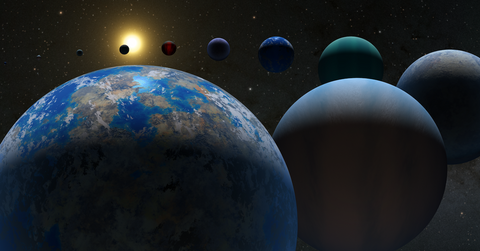At Least 5,000 Exoplanets Exist Outside Our Solar System, NASA Confirms
Published March 22 2022, 3:13 p.m. ET
Over the years, you've most likely become somewhat familiar with our solar system's eight planets: Mercury, Venus, Earth, Mars, Jupiter, Saturn, Uranus, and Neptune. But evidently, that's just within our solar system — in fact, NASA recently confirmed there are more than 5,000 exoplanets that exist beyond our solar system. Most of them are gaseous, some are rocky, and each of them are extremely unique.
The first exoplanets were discovered back in 1992, when Aleksander Wolszczan and Dale Frail discovered two rocky objects orbiting PSR B1 257+12 in the constellation Virgo. Then, they discovered a third two years later, in 1994.
"If you can find planets around a neutron star, planets have to be basically everywhere," Wolszczan told NASA at the time, encouraging scientists to look for the thousands more that have been discovered since. "The planet production process has to be very robust."
Scientists suspect that the now-more than 5,000 known exoplanets is only a small fraction of the Milky Way. In fact, they think there could actually be hundreds of billions of undiscovered ones out there.
"It's not just a number," NASA Exoplanet Science Institute scientist, Jessie Christiansen told Daily Mail. "Each one of them is a new world, a brand new planet. I get excited about every one because we don't know anything about them."
What to know about the 5,000 exoplanets outside our solar system:
NASA's Jet Propulsion Laboratory confirmed there are at least 5,005 planets outside our solar system, according to NPR. About 30 percent are rocky large like Earth, while about 35 percent of them are akin to Neptune — small, icy, and desolate.
"It's not just a number," Jessie Christiansen, from the NASA Exoplanet Archive, as per NPR. "Each one of them is a new world, a brand-new planet. I get excited about every one because we don't know anything about them."
Christiansen was a grad student in the 2000s, when there were only around 100 known exoplanets.
"That's partly why I wanted to go into the field — because it was brand new and so exciting that people were finding planets around other stars," Christiansen stated, as per CNN.
"Now, exoplanets are almost ordinary. My colleague David Ciardi (of the NASA Exoplanet Archive) pointed out the other day that half of the people alive have never lived in a world where we didn't know about exoplanets."
Scientists are continuously creating and further developing new types of technology that make exoplanet discovery even easier, such as the James Webb Space Telescope and the Transiting Exoplanet Survey Satellite. But regardless, NASA says the galaxy is likely home to many more planets — and most likely many more walks of life.
"To my thinking, it is inevitable that we'll find some kind of life somewhere — most likely of some primitive kind," Wolszczan told NPR.
How are we going to keep discovering exoplanets?
In addition to continuing to develop more technology, there are many ways scientists are going to keep working to discover more exoplanets. According to Cal Tech, they are going to look at how different types of planets are created, and how stars develop over time. But having more exoplanets definitely makes it easier to conduct research.
"To be fair, astronomers were doing statistics on planets back when there were only a handful. They thought, "Hey, cool! What can we do with six?" Well, now we have 5,000! And with upcoming missions like NASA's Nancy Grace Roman Space Telescope and the European Space Agency's PLATO [PLAnetary Transits and Oscillation of stars] mission, we are going to find a lot more," Christiansen told Cal Tech.
Hopefully the next discovery will relate to extraterrestrial life — that will come in due time.
Green Matters’ new book, Green Living, is the perfect guide to living an eco-friendly lifestyle for people at every stage of the process. You can order Green Living here.
